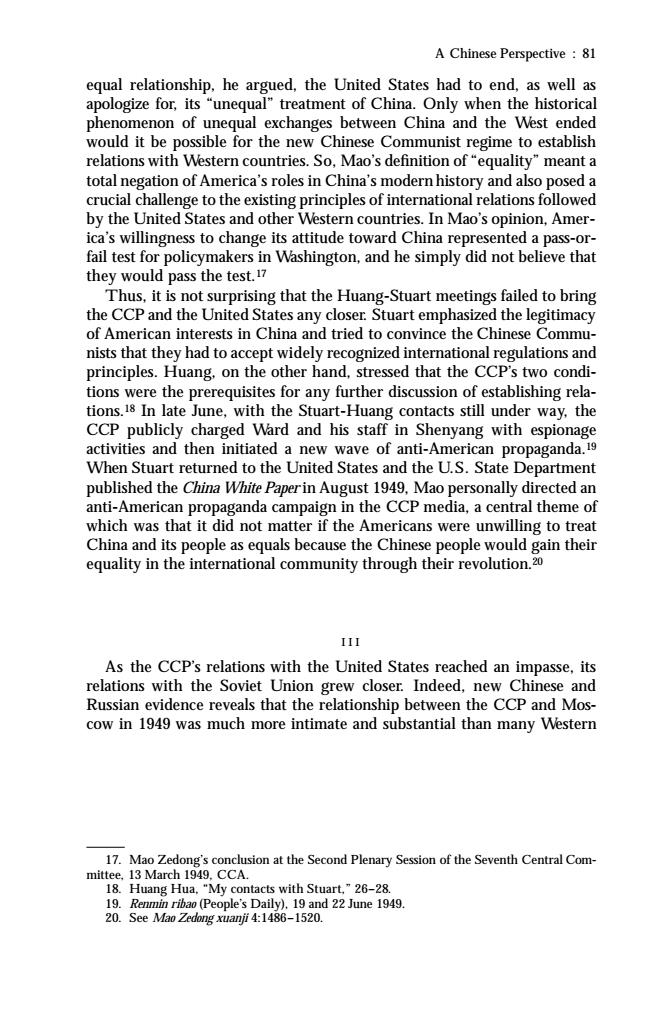正在加载图片...

A Chinese Perspective 81 equal relationship,he argued,the United States had to end,as well as apologize for,its "unequal"treatment of China.Only when the historical phenomenon of unequal exchanges between China and the West ended would it be possible for the new Chinese Communist regime to establish relations with Western countries.So,Mao's definition of "equality"meant a total negation of America's roles in China's modern history and also posed a crucial challenge to the existing principles of international relations followed by the United States and other Western countries.In Mao's opinion,Amer- ica's willingness to change its attitude toward China represented a pass-or- fail test for policymakers in Washington,and he simply did not believe that they would pass the test.17 Thus,it is not surprising that the Huang-Stuart meetings failed to bring the CCP and the United States any closer.Stuart emphasized the legitimacy of American interests in China and tried to convince the Chinese Commu- nists that they had to accept widely recognized international regulations and principles.Huang.on the other hand,stressed that the CCP's two condi- tions were the prerequisites for any further discussion of establishing rela- tions.18 In late June,with the Stuart-Huang contacts still under way,the CCP publicly charged Ward and his staff in Shenyang with espionage activities and then initiated a new wave of anti-American propaganda.19 When Stuart returned to the United States and the U.S.State Department published the China White Paperin August 1949.Mao personally directed an anti-American propaganda campaign in the CCP media,a central theme of which was that it did not matter if the Americans were unwilling to treat China and its people as equals because the Chinese people would gain their equality in the international community through their revolution.20 III As the CCP's relations with the United States reached an impasse,its relations with the Soviet Union grew closer.Indeed,new Chinese and Russian evidence reveals that the relationship between the CCP and Mos- cow in 1949 was much more intimate and substantial than many Western 17.Mao Zedong's conclusion at the Second Plenary Session of the Seventh Central Com- mittee.13 March 1949.CCA. 18.Huang Hua,"My contacts with Stuart,"26-28. 19.Renmin ribao(People's Daily).19 and 22 June 1949. 20.See Mao Zedong xuanji 4:1486-1520.A Chinese Perspective : 81 equal relationship, he argued, the United States had to end, as well as apologize for, its “unequal” treatment of China. Only when the historical phenomenon of unequal exchanges between China and the West ended would it be possible for the new Chinese Communist regime to establish relations with Western countries. So, Mao’s definition of “equality” meant a total negation of America’s roles in China’s modern history and also posed a crucial challenge to the existing principles of international relations followed by the United States and other Western countries. In Mao’s opinion, America’s willingness to change its attitude toward China represented a pass-orfail test for policymakers in Washington, and he simply did not believe that they would pass the test.17 Thus, it is not surprising that the Huang-Stuart meetings failed to bring the CCP and the United States any closer. Stuart emphasized the legitimacy of American interests in China and tried to convince the Chinese Communists that they had to accept widely recognized international regulations and principles. Huang, on the other hand, stressed that the CCP’s two conditions were the prerequisites for any further discussion of establishing relations.18 In late June, with the Stuart-Huang contacts still under way, the CCP publicly charged Ward and his staff in Shenyang with espionage activities and then initiated a new wave of anti-American propaganda.19 When Stuart returned to the United States and the U.S. State Department published the China White Paper in August 1949, Mao personally directed an anti-American propaganda campaign in the CCP media, a central theme of which was that it did not matter if the Americans were unwilling to treat China and its people as equals because the Chinese people would gain their equality in the international community through their revolution.20 I I I As the CCP’s relations with the United States reached an impasse, its relations with the Soviet Union grew closer. Indeed, new Chinese and Russian evidence reveals that the relationship between the CCP and Moscow in 1949 was much more intimate and substantial than many Western 17. Mao Zedong’s conclusion at the Second Plenary Session of the Seventh Central Committee, 13 March 1949, CCA. 18. Huang Hua, “My contacts with Stuart,” 26–28. 19. Renmin ribao (People’s Daily), 19 and 22 June 1949. 20. See Mao Zedong xuanji 4:1486–1520